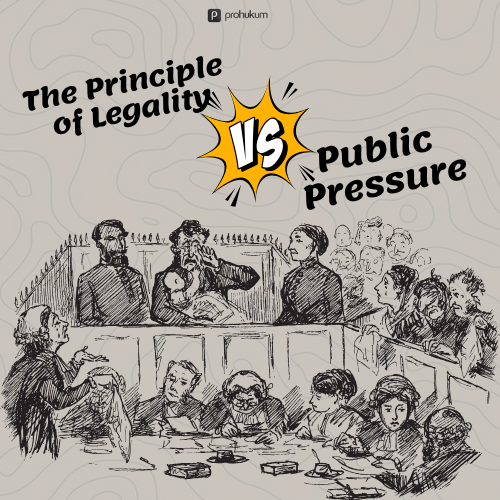The phenomenon of “No Viral No Justice” is increasingly heard in society. Many legal cases are only taken seriously after receiving public attention on social media. This situation raises the question: to what extent is the law in Indonesia subject to the principle of legality? And to what extent is it influenced by public pressure?

The Principle of Legality in the Law
The principle of legality is a fundamental principle in a state governed by law. This means that a person can only be punished based on applicable law, not public opinion. Article 1 paragraph (1) of the Criminal Code states: “No act can be punished except by the force of criminal law in existing legislation.”
With this principle, law enforcement officials are required to process cases based on the rules. According to Jimly Asshiddiqie in his book Konstitusi dan Konstitusionalisme Indonesia (The Constitution and Constitutionalism in Indonesia, 2005), the principle of legality is an integral part of guaranteeing human rights in the judicial process.
Public Pressure in Practice
However in practice, many cases receive greater attention when they go viral on social media. For example, cases of abuse, harassment, and corruption often receive a quick response. After netizens combine certain hashtags. Public pressure can make authorities more alert. But on the other hand, it has the potential to cause injustice because the legal process seems to be carried out. Not because of the rules, but because of the popularity of the case.
The Dilemma of Law Enforcement
This dilemma highlights the gap between normative law and factual law:
Normative Law: should be based on legislation, independent of public opinion.
Factual Law: is often influenced by media exposure, group pressure, and even virality.
When public pressure becomes too dominant, it risks overshadowing the principle of legality
Trial by the public: the public judges faster than the courts.
Discrimination: cases that do not go viral tend to be ignored, even though the victims equally need justice.
Delegitimization of the law: the public trusts social media more than legal institutions.
Efforts to Balance
To respond to public demands without violating the principle of legality, several steps can be taken:
Transparency of the legal process – Officials are required to provide official updates so that the public does not rely solely on social media.
Strengthening of supervisory institutions – The Judicial Commission, the National Police Commission, and similar institutions must actively ensure the integrity of officials.
Public legal literacy – The public needs to understand that justice is not just about going viral. The public needs to know requires proper legal procedures. Satjipto Rahardjo in Law and Society (2002) emphasizes the importance of responsive law, namely law that is open to the aspirations of the public but still adheres to the principle of legality.
Conclusion
The principle of legality is the foundation of law enforcement in Indonesia. However, the phenomenon of public pressure indicates a crisis of confidence in law enforcement agencies. Instead of viewing this as a threat. Authorities can use public demands as a reminder of the importance of transparency and accountability. In this way, the law continues to be enforced according to the rules, but without ignoring the aspirations of the people.
Ultimately, a balance between the principle of legality and public pressure can only be achieved if law enforcement agencies consistently enforce the rules. The public also needs to be encouraged to stay critical and legally savvy. With this combination, the judicial process is not only normatively valid, but also gains strong social legitimacy.
